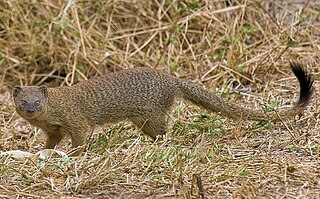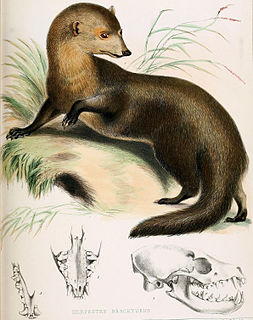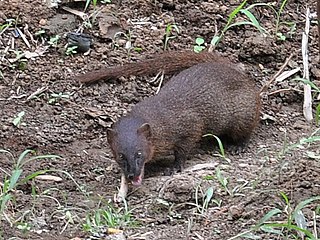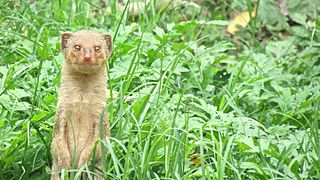
A mongoose is a small terrestrial carnivorous mammal belonging to the family Herpestidae. This family is currently split into two subfamilies, the Herpestinae and the Mungotinae. The Herpestinae comprises 23 living species that are native to southern Europe, Africa and Asia, whereas the Mungotinae comprises 11 species native to Africa. The Herpestidae originated about 21.8 ± 3.6 million years ago in the Early Miocene and genetically diverged into two main genetic lineages between 19.1 and 18.5 ± 3.5 million years ago.

The yellow mongoose, sometimes referred to as the red meerkat, is a member of the mongoose family. It averages about 0.45 kg (1 lb) in weight and about 510 mm (20 in) in length. It lives in open country, semi-desert scrubland and grasslands in Angola, Botswana, South Africa, Namibia, and Zimbabwe.

Hose's palm civet, also known as Hose's civet, is a viverrid species endemic to the island of Borneo. It is listed on the IUCN Red List as Vulnerable because of an ongoing population decline, estimated to be more than 30% over the last three generations and suspected to be more than 30% in the next three generations due to declines in population inferred from habitat destruction and degradation.

The stripe-necked mongoose is a mongoose species native to forests and shrublands from southern India to Sri Lanka.

The crab-eating mongoose is a mongoose species ranging from the northeastern Indian subcontinent and Southeast Asia to southern China and Taiwan. It is listed as Least Concern on the IUCN Red List.

The Egyptian mongoose, also known as ichneumon, is a mongoose species native to the coastal regions along the Mediterranean Sea between North Africa and Turkey, tropical and subtropical grasslands, savannas, and shrublands in Africa. Whether it is introduced or native to the Iberian Peninsula is in some doubt. Because of its widespread occurrence, it is listed as Least Concern on the IUCN Red List.

The common slender mongoose, also known as the black-tipped mongoose or the black-tailed mongoose, is a very common mongoose species native to sub-Saharan Africa.

The short-tailed mongoose is a mongoose species native to Peninsular Malaysia, Sumatra and Borneo. It inhabits evergreen forest and rural gardens from sea level to an elevation of 1,500 m (4,900 ft). It is listed as Near Threatened on the IUCN Red List since 2008.

The Indian grey mongoose is a mongoose species native to the Indian subcontinent and West Asia. It is listed as Least Concern on the IUCN Red List. The grey mongoose inhabits open forests, scrublands and cultivated fields, often close to human habitation. It lives in burrows, hedgerows and thickets, among groves of trees, and takes shelter under rocks or bushes and even in drains. It is very bold and inquisitive but wary, seldom venturing far from cover. It climbs very well. Usually found singly or in pairs. It preys on rodents, snakes, birds’ eggs and hatchlings, lizards, and a variety of invertebrates. Along the Chambal River it occasionally feeds on gharial eggs. It breeds throughout the year.

The Indian brown mongoose is a mongoose species native to the Western Ghats in India and the western coast in Sri Lanka. It is listed as least concern on the IUCN Red List.

The Javan mongoose is a mongoose species native to Southeast Asia.

The ruddy mongoose is a mongoose species native to hill forests in India and Sri Lanka.

The white-tailed mongoose is a species in the mongoose family Herpestidae. It is the only member of the genus Ichneumia.

Herpestes is a genus within the mongoose family Herpestidae. Several species in the family are known as slender mongooses. It is the type genus of the family, and comprises 5-6 living species, each with several subspecies. Fossil remains of three prehistoric species were excavated in France, and described in 1853.

The Somalian slender mongoose is a small mammal found in Somalia and adjacent regions. It is a small to medium-sized carnivoran, averaging about 0.6 kg (1.3 lb) in weight.

The small Indian mongoose is a mongoose species native to Iraq and northern South Asia; it has also been introduced to many regions of the world, such as several Caribbean and Pacific islands.














